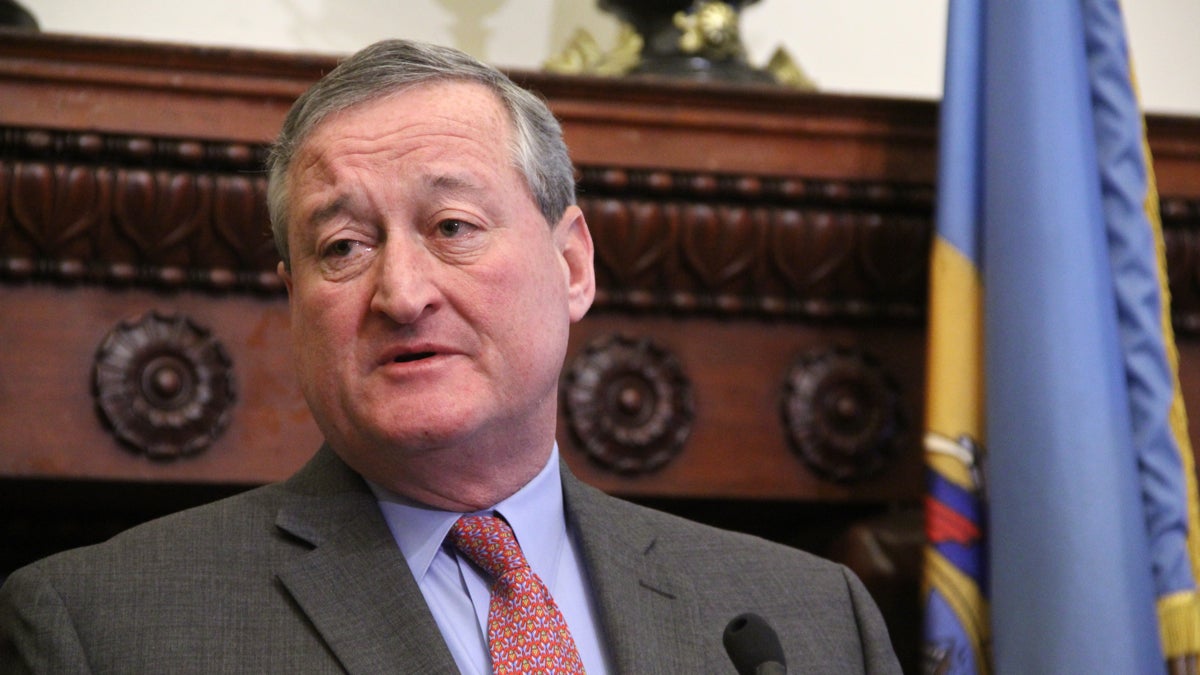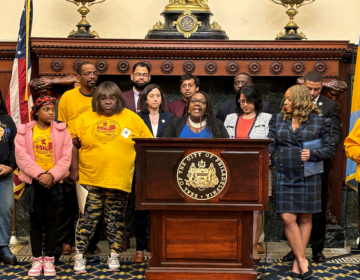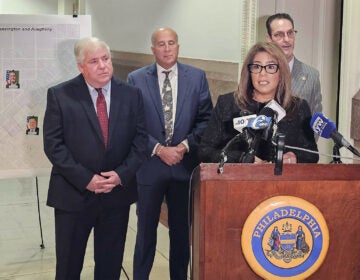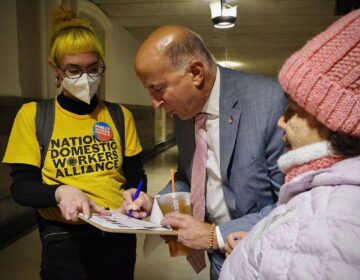Kenney’s $15 minimum wage bill advances
The legislation would increase the minimum wage for city workers and employees of city contractors and subcontractors over the next four years, hitting $15 an hour in 2022.

Philadelphia Mayor Jim Kenney. (Emma Lee/WHYY)
This story originally appeared on PlanPhilly.
—
Mayor Jim Kenney’s push to raise the minimum wage for city-contracted workers to $15 an hour moved one step forward on Tuesday with a unanimous City Council committee vote in support of the incremental pay raise.
The legislation would increase the minimum wage for city workers and employees of city contractors and subcontractors over the next four years, hitting $15 an hour in 2022. It comes four years after the City of Philadelphia first mandated a $12-an-hour minimum wage for city workers, contractors, and subcontractors.
The city doesn’t know how many workers employed by contractors and subcontractors would be affected by the proposed law but the impact would be significant. The city spends hundreds of millions of dollars annually on professional service contracts to do everything from keeping the airport running to providing afterschool care and elder care to administering animal control centers so workers like baggage handlers, after-school aides, janitors or environmental services workers would all see their paychecks affected.
The Committee on Labor and Civil Service‘s green light means that the bill will go before City Council for a first reading on December 6. It was originally introduced by City Councilman Mark Squilla in September on behalf of Kenney. Squilla said on Tuesday that the proposed law sets an example for other businesses.
“We can show that the city cares about the people of this city,” said Squilla. “If we do that and if we lead others will follow. And you’ll see private industries start to follow along, and knowing that people of our city deserve a living wage.”
The current minimum wage for city-paid workers is $12.20, compared to Pennsylvania’s minimum wage of $7.25. State workers and employees of state contractors and subcontractors earn a minimum wage of $12 an hour with raises set to bring state workers up to $15 per hour by 2024.
If Kenney’s proposed bill becomes law, a significant minimum wage increase to $13.25 will take effect on July 1, 2019, and continue to increase each year after until 2022 when it hits $15 an hour.
As for contracts, the ordinance will be effective 120 days after becoming law and will apply to new, renewed, and amended city contracts.
Richard Lazar, deputy mayor of labor, said the proposed bill would help the city’s poverty issue.
Philadelphia remains the poorest of the country’s top 10 major cities with a poverty rate of about 26 percent that has not budged in years, despite an increasingly prosperous Center City and increased property values, and rents, citywide. With the cost of living in Philadelphia inching up and the gap between the haves and have-nots growing, Kenney has struggled to move the needle on anti-poverty efforts. The proposed wage hike is one way to mitigate the problem.
“At 15 an hour, hardworking Philadelphians can truly begin to climb out of poverty,” said Lazar.
The bill’s move forward comes weeks after the Council’s Committee on Law and Government moved Councilwoman Helen Gym’s “Fair Workweek” scheduling bill one step closer to becoming law.
Gym’s bill requires large-scale employers to provide workers with their schedules 10 days ahead, and pay them for adjustments made after, in addition to any work performed.
“I am proud that we are going to talk about what it means to lift up this city’s minimum wage,” said Gym on Tuesday. “And have it extend to all of our subcontractors within the city of Philadelphia, an extremely powerful responsibility.”
UNITE HERE Philly leader Michelle Newman works at a bagel shop at the Philadelphia Airport making $13 an hour. She says “working at the airport has been a really positive thing,” but she still struggles to make ends meet.
The mother of three said she gets by on food stamps and cutting back “where I can.”
Newman says she wants to provide more for her children “more than just a roof” over their heads, and take them on a trip or “simply somewhere fun.” But rent, food, child care, transportation, and utility bills makes is hard to do much else.
“When it comes to ending poverty in Philadelphia there are no shortcuts,” she said. “We have to raise wages.”
WHYY is your source for fact-based, in-depth journalism and information. As a nonprofit organization, we rely on financial support from readers like you. Please give today.







